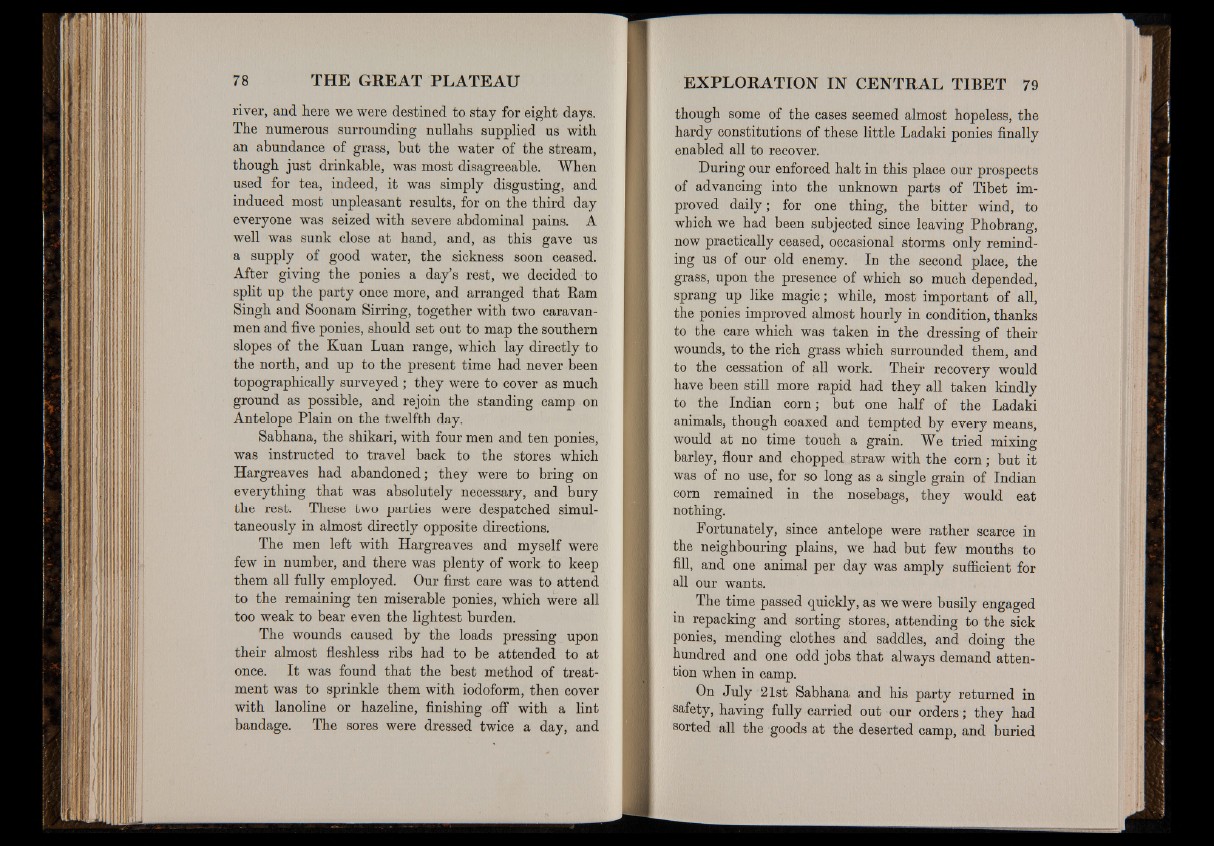
river, and here we were destined to stay for eight days.
The numerous surrounding nullahs supplied us with
an abundance of grass, but the water of the stream,
though just drinkable, was most disagreeable. When
used for tea, indeed, it was simply disgusting, and
induced most unpleasant results, for on the third day
everyone was seized with severe abdominal pains. A
well was sunk close at hand, and, as this gave us
a supply of good water, the sickness soon ceased.
After giving the ponies a day’s rest, we decided to
split up the party once more, and arranged that Ram
Singh and Soonam Sirring, together with two caravan-
men and five ponies, should set out to map the southern
slopes of the Kuan Luan range, which lay directly to
the north, and up to the present time had never been
topographically surveyed ; they were to cover as much
ground as possible, and rejoin the standing camp on
Antelope Plain on the twelfth day.
Sabhana, the shikari, with four men and ten ponies,
was instructed to travel back to the stores which
Hargreaves had abandoned; they were to bring on
everything that was absolutely necessary, and bury
the rest. These two parties were despatched simultaneously
in almost directly opposite directions.
The men left with Hargreaves and myself were
few in number, and there was plenty of work to keep
them all fully employed. Our first care was to attend
to the remaining ten miserable ponies, which were all
too weak to bear even the lightest burden.
The wounds caused by the loads pressing upon
their almost fleshless ribs had to be attended to at
once. It was found that the best method of treatment
was to sprinkle them with iodoform, then cover
with lanoline or hazeline, finishing off with a lint
bandage. The sores were dressed twice a day, and
though some of the cases seemed almost hopeless, the
hardy constitutions of these little Ladaki ponies finally
enabled all to recover.
During our enforced halt in this place our prospects
of advancing into the unknown parts of Tibet improved
daily; for one thing, the bitter wind, to
which we had been subjected since leaving Phobrang,
now practically ceased, occasional storms only reminding
us of our old enemy. In the second place, the
grass, upon the presence of which so much depended,
sprang up like magic; while, most important of all,
the ponies improved almost hourly in condition, thanks
to the care which was taken in the dressing of their
wounds, to the rich grass which surrounded them, and
to the cessation of all work. Their recovery would
have been still more rapid had they all taken kindly
to the Indian corn; but one half of the Ladaki
animals, though coaxed and tempted by every means,
would at no time touch a grain. We tried mixing
barley, flour and chopped straw with the corn; but it
was of no use, for so long as a single grain of Indian
corn remained in the nosebags, they would eat
nothing.
Fortunately, since antelope were rather scarce in
the neighbouring plains, we had but few mouths to
fill, and one animal per day was amply sufficient for
all our wants.
The time passed quickly, as we were busily engaged
in repacking and sorting stores, attending to the sick
ponies, mending clothes and saddles, and doing the
hundred and one odd jobs that always demand attention
when in camp.
On July 21st Sabhana and his party returned in
safety, having fully carried out our orders; they had
sorted all the goods at the deserted camp, and buried